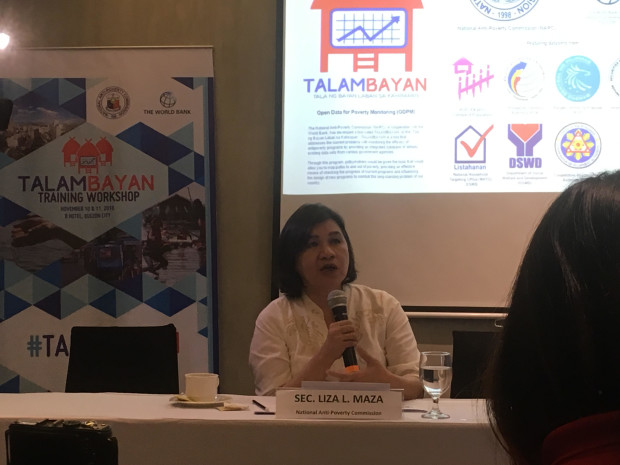NAPC database paints picture of multifaceted poverty
The National Anti-Poverty Commission (NAPC) on Thursday launched a database of consolidated poverty-related data sets in a bid to aid the government in crafting policies for the poor and to ensure that projects are serving their purpose of alleviating poverty.
In her speech during the launch of the online data warehouse in Quezon City, NAPC chair Liza Maza said the Tala ng Bayan Laban sa Kahirapan (Talambayan) database would show the multidimensional and multifaceted nature of poverty in the country, as it monitors and evaluates the government’s antipoverty programs.
“We come to realize that poverty—real poverty—has a definite face, a scent, texture, color, taste and sound. These realities get lost in the avalanche of data, information, statistics, and figures we often also read about when dealing with poverty issues,” Maza said.
“Still, we need these data and figures that give us the big picture about the poverty in our midst—so that stories of marginalized folks will not be dismissed as isolated cases,” she added.
Maza said poverty incidence among Filipinos was estimated at 21.6 percent in 2015, while the proportion of Filipinos whose incomes fell below the food threshold was at 81 percent.
Article continues after this advertisementAside from consolidating all poverty-related data sets by different various agencies in a single platform, Maza said the Talambayan database is also essential in generating more efficient programs and in providing valuable inputs in the Duterte administration’s development plan.
Article continues after this advertisement“For the longest time we are saying that growth in our country is not inclusive. So who are holding the assets? Pwedeng maipakita dito ‘yun. Nagiging visually real ‘yung inequality (It could be shown here. The inequality becomes visually real),” she said.
“This way, we can be truly sure that the information that we have accurately reflects the realities on the ground,” Maza added.
Project lead consultant James Miraflor of World Bank-Institutional Development Fund said the database stitched together and established correlations between various socioeconomic government data “in a way that effectively conveys a narrative or insight in addressing a concrete policy problem in a particular poverty dimension.”
Talambayan, which NAPC said uses technology similar to ones used by corporations for business intelligence, holds data on local poverty and barangay (village) and household conditions, such as access to national roads and transportation, education, hospitals and health centers. It also contains relevant information on local economy, assets and enterprises.
Miraflor said the Talambayan, which took more than two years to be completed, currently makes use of data from the National Household Targeting System of the Department of Social Welfare and Development, sample-based surveys of the Philippine Statistics Authority and self-rated poverty data gathered by pollsters. But he said it will soon integrate other relevant data from other agencies like the Department of Interior and Local Government, the Department of Budget and Management and PhilHealth.
But at present, the NAPC said the Talambayan database prototype is only available to select government agencies and NAPC basic sector representatives while public access is still being ironed out.
“Yes, Talambayan will have a variety of uses. It can even serve as a platform to rectify laws and policies that are anti-poor in nature. But there is a caveat to Talambayan. We must realize this early that Talambayan is not an antipoverty magic wand,” Maza said.
“Not all the correlated poverty data in the world can amount to much in the absence of decisive leadership and a committed pro-poor citizenry,” she added. RAM/rga
